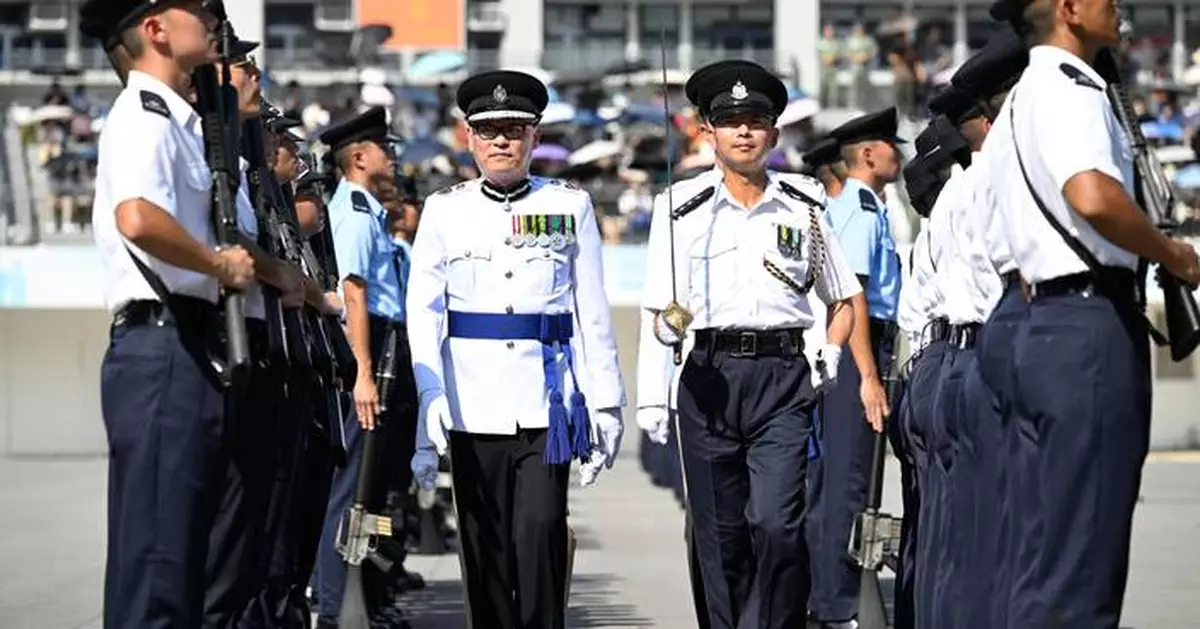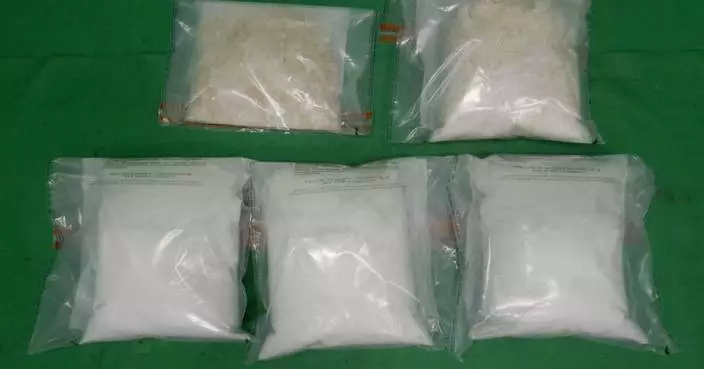Deputy Commissioner of Police (National Security) inspects passing-out parade at HK Police College
The Deputy Commissioner of Police (National Security), Mr Kan Kai-yan, inspected the passing-out parade for 29 probationary inspectors and 164 recruit police constables at the Hong Kong Police College today (September 14) and witnessed the moment they became new members of the Force.
Speaking at the graduation ceremony, Mr Kan Kai-yan thanked the family and friends who attended the ceremony for their support and trust in the graduates, enabling them to be a powerful force resolutely safeguarding their “home” - Hong Kong. He was proud to see the graduates formally shoulder the mission of “safeguarding their family and country and upholding the rule of law”.
He encouraged the graduates that no matter what new challenges and difficulties they face in the future, they should not forget their original intention of joining the Force in fighting against evils and be a good policeman. He also used a popular movie quote – remember one word called “heart”, to encourage the graduates to do everything well with their hearts.
Mr Kan said that whether it is dealing with a request from citizens, solving problems in relation to people's livelihood and community security, or safeguarding national security, everyone of them should do their utmost with their “hearts”, and the public would feel the enthusiasm and professionalism that a good policeman should have.
He continued that with the change of the times and circumstances, “evils” do not only refer to fraudsters who cheat in real life and the cyber world, but also traitors who endanger national security. In addition to the ever changing modus operandi of crimes, there are also challenges in dealing with unprecedented national security risks.
“As the head of the National Security Department of the Force, I especially want to refer to the national security risks we are facing. At present, our society seems to be stable on the surface, but in fact the national security risk is secretly surging everywhere; there are still people who use “soft confrontation” to infiltrate the society and endanger national security; external forces continue to keep an eye on us, intending to curb the development of the country by interfering in Hong Kong's affairs and wantonly smearing the city and our country; and local terrorism is also going underground. In recent years, we have detected many cases involving firearms and bombs, which is enough proof of such risks. It has not only posed a threat to national security, but also seriously endangered the personal safety of every Hong Kong citizen.”
He believes that “safeguarding national security” is the responsibility of every officer, and it is also one of the strategic directions of the Force and one of the operational priorities of the Commissioner of Police.
“The Safeguarding National Security Ordinance which came to effect this year clearly stipulates that we must take national security as the most important consideration in making any decision and carrying out our duties. Therefore, in the face of the national security risks and as the forefront of protecting our people’s lives and property, all of us should have national security awareness to identify national security risk at an early stage for proper prevention and swift response, working together to fulfil the mission of safeguarding national security.”
Finally, he once again encouraged the graduates, who are about to take up their respective posts that no matter what environment and difficulties they face, they should always keep in mind and adhere to their original intention of joining the Force in fighting against evils, carrying out duties in their own post with “heart”, contributing to the Force and society, maintaining the stability and prosperity of the country and Hong Kong, and enabling every citizen to live well and thrive.

Deputy Commissioner of Police (National Security) inspects passing-out parade at HK Police College Source: HKSAR Government Press Releases
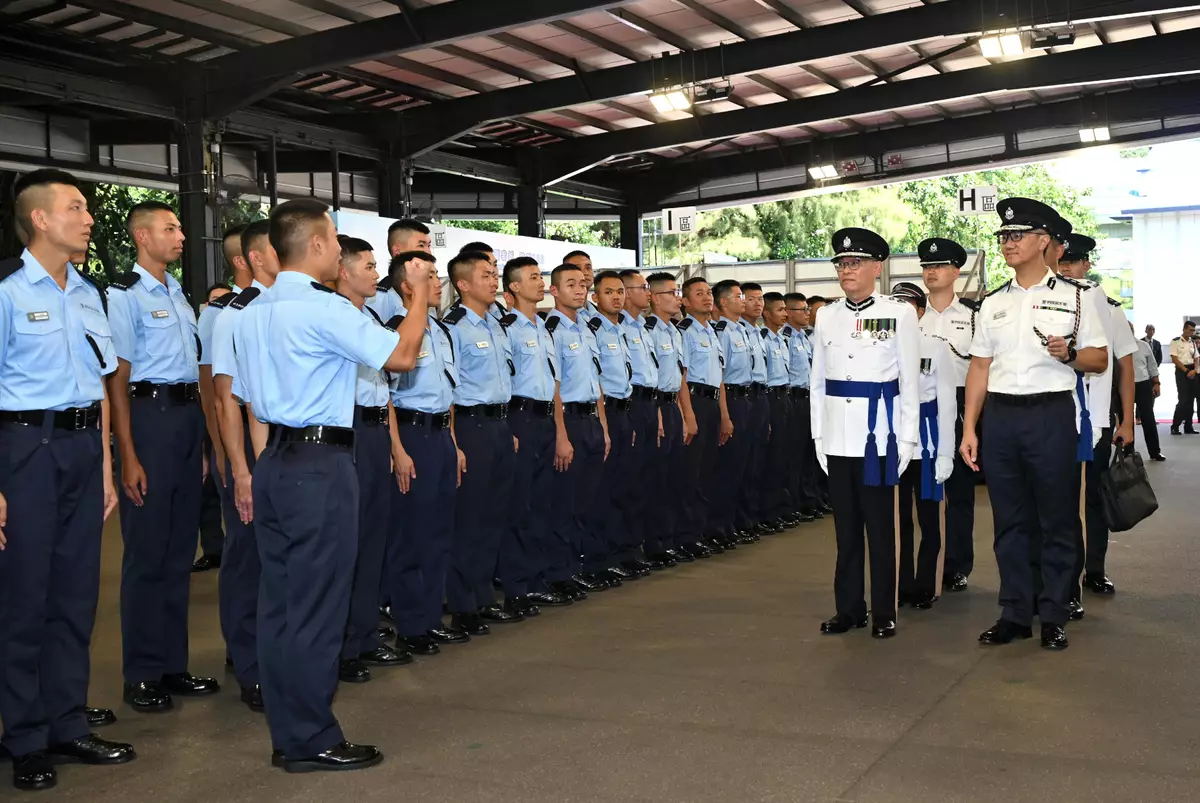
Deputy Commissioner of Police (National Security) inspects passing-out parade at HK Police College Source: HKSAR Government Press Releases
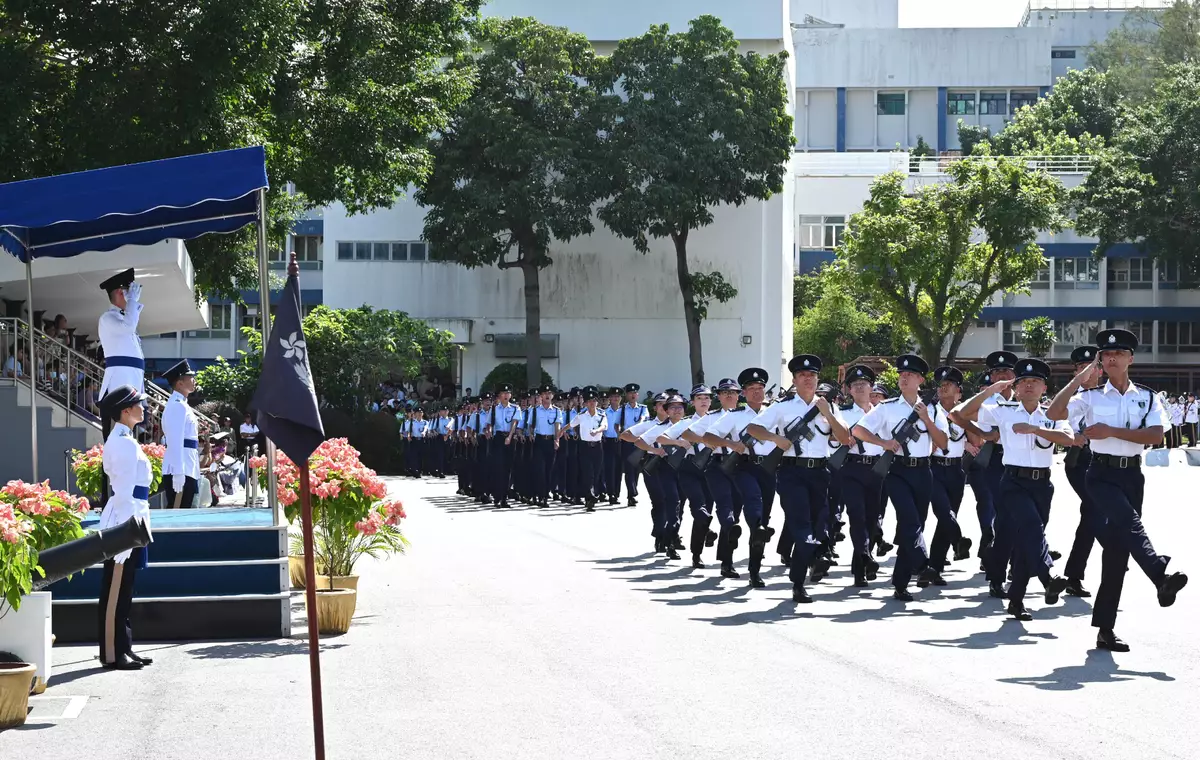
Deputy Commissioner of Police (National Security) inspects passing-out parade at HK Police College Source: HKSAR Government Press Releases
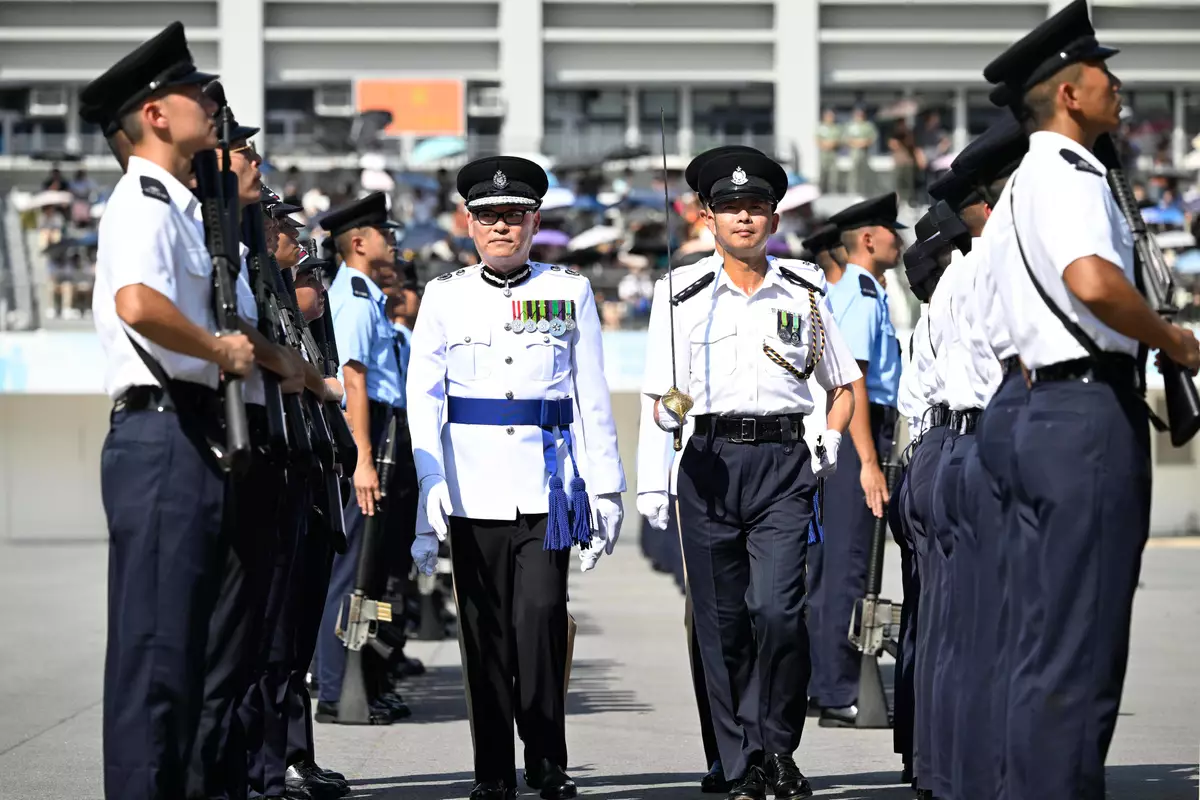
Deputy Commissioner of Police (National Security) inspects passing-out parade at HK Police College Source: HKSAR Government Press Releases
CHP reminds public on precautions against cold weather
The Centre for Health Protection (CHP) of the Department of Health (DH) today (December 22) reminded the public, particularly the elderly and people with chronic illnesses, to adopt appropriate measures to protect their health in view of the cold weather.
A spokesman for the CHP said that cold weather can easily trigger or exacerbate diseases, especially among the elderly and persons suffering from heart disease, respiratory illnesses or other chronic illnesses.
"Elderly people have less insulating fat beneath their skin to keep them warm, and their body temperature control mechanisms may be weaker. Their body may not be able to appropriately respond to thecold weather," the spokesman said.
Some senior persons may have decreased mobility, which can impair their ability to generate and conserve body heat. Chronic illnesses, such as hypertension, diabetes and endocrine disorders, may undermine the health of elderly people and lower their metabolic rate, subsequently causing their body to generate less heat. Persons with chronic illnesses, such as chronic respiratory illnesses or heart disease, are vulnerable to disease aggravation due to cold weather.
The CHP reminded the public, in particular the elderly and persons with chronic illnesses, to adopt the following preventive measures:
Take note of the weather forecast. Wear warm clothing, including hats, scarves, gloves and socks, accordingly;
Consume sufficient food to ensure adequate calorie intake;
Perform regular exercise to facilitate blood circulation and heat production;
Stay in a warm environment and avoid prolonged outdoor exposure;
Use heaters with care and maintain adequate indoor ventilation; and
Seek medical advice if feeling unwell.
In addition, the public should avoid alcoholic beverages.
"Drinking alcohol cannot keep you warm. Alcohol accelerates the loss of body heat through dilated blood vessels, resulting in chilling instead," the spokesman said.
"Parents should ensure that babies are sufficiently warm, but it is also important to keep babies relatively lightly clothed to avoid overheating them," the spokesman added.
Parents should observe the following safety measures when putting their children to bed:
Keep the room well ventilated and at a comfortable temperature;
Always place babies on their backs to sleep. Leave their heads, faces and arms uncovered during sleep;
Babies do not need pillows. Place babies on a firm and well-fitted mattress to sleep. Avoid soft objects, pillows and loose bedding;
Let babies sleep in a cot placed near their parents' bed; and
Maintain a smoke-free environment.
In addition, many respiratory pathogens, including influenza and SARS-CoV-2, may have increasing activity and community transmission during winter. Seasonal influenza vaccination is recommended for all persons aged 6 months or above, except those with known contraindications. Persons at higher risk of getting influenza and its complications, including the elderly and children, should receive seasonal influenza vaccinations early. Please see details of the vaccination schemes on theCHP's website.
A person who gets influenza and COVID-19 at the same time may be more seriously ill and would have a higher risk of death. It is important for elderly persons, especially those residing in residential care homes, to receive both a seasonal influenza vaccination and a COVID-19 vaccination. They should also receive an additional booster against COVID-19 according to recommendations as soon as possible. The public should also maintain good personal and environmental hygiene against respiratory illnesses and note the following:
Surgical masks can prevent transmission of respiratory viruses from ill persons. It is essential for persons who are symptomatic (even if having mild symptoms) to wear a surgical mask;
Wear a surgical mask when taking public transport or staying in crowded places. It is important to wear a mask properly, including performing hand hygiene before wearing and after removing a mask;
Avoid touching one's eyes, mouth and nose;
Wash hands with liquid soap and water properly whenever possibly contaminated;
When hands are not visibly soiled, clean them with 70 to 80 per cent alcohol-based handrub;
Cover the mouth and nose with tissue paper when sneezing or coughing. Dispose of soiled tissue paper properly into a lidded rubbish bin and wash hands thoroughly afterwards;
Maintain good indoor ventilation;
When having respiratory symptoms, wear a surgical mask, refrain from work or attending classes at school, avoid going to crowded places and seek medical advice promptly; and
Maintain a balanced diet, exercise regularly, take adequate rest, do not smoke and avoid overstress.
Food-borne diseases, particularly those linked to hotpot cuisine, are also common in cold weather. The following preventive measures should be taken:
Wash hands before handling and consuming food;
Do not patronise unlicensed vendors or those with poor hygienic standards while selecting food;
Wash and cook all food thoroughly;
Vegetables should be washed thoroughly in clean running water before cooking and consumption. When appropriate, scrub vegetables with hard surfaces with a clean brush to remove dirt and substances, including pesticide residues and contaminants, from surfaces and crevices;
Shrimps should be fully cooked until the shells turn red and the flesh turns white and opaque;
For shellfish such as scallops and geoduck, scrub the shells thoroughly and remove internal organs;
Do not eat any undercooked freshwater aquatic products. To ensure that the food is thoroughly cooked, the centre of the food should reach a temperature of at least 75 degrees Celsius so as to destroy pathogen;
Most hotpot ingredients should be stored in a refrigerator at 4 degrees C or below, while frozen food should be stored in a freezer at -18 degrees C or below;
Never use raw eggs as a dipping sauce for hotpot; and
Use different sets of chopsticks to handle raw and cooked food to avoid cross-contamination.
In addition, when using fuel-burning appliances, especially in indoor areas, the public should ensure adequate ventilation to avoid harmful exposure to carbon monoxide (CO) and prevent CO poisoning.
For more health information, the public may call the DH's Health Education Infoline (2833 0111) or visit theCHP's websiteandFacebook Fanpage.
The public may also call Dial-a-Weather (1878 200) or visit thewebsite of the Hong Kong Observatoryfor the latest weather information and forecasts, or itspage on Weather Information for Senior Citizens.






